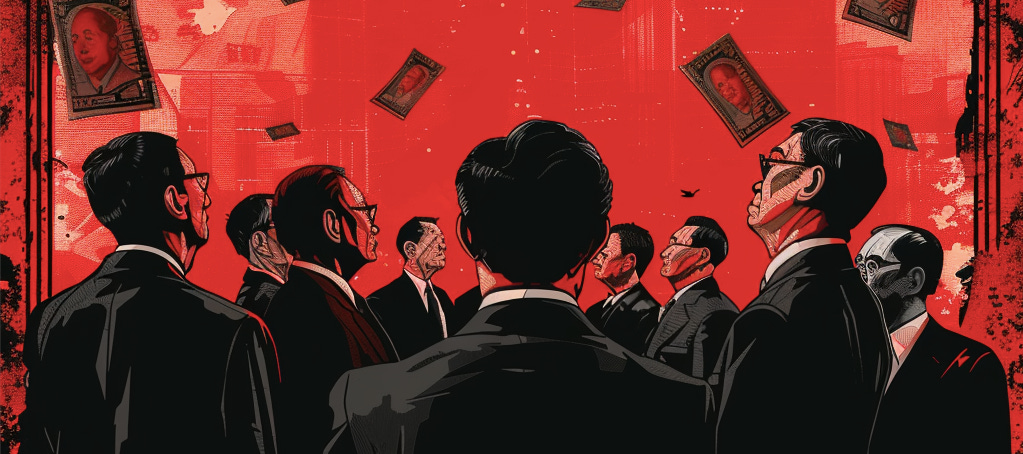China wants venture capital to help win Sino-US tech war
The essential developments in China's economy as of Friday, 21 June 2024.
Key themes for today:
China calls for both venture capital and the stock market to serve domestic tech innovation and "modernisation with Chinese characteristics."
Securities regulator says it will intervene in the stock market to "deal with market fluctuations."
Former central bank chief Yi Gang declares the market to be the most efficient form of resource allocation, calls for greater reform and opening.
MOF to provide fiscal support to development of promising private tech companies in key areas.
Chinese central bank highlights usage of monetary policy to achieve structural changes in the economy as well as support recovery.
PBOC governor highlights key changes to how monetary policy is implemented in China.
Local governments ordered by Beijing step up purchase of real estate for conversion into social housing.
China wants venture capital to drive national tech independence
China's State Council issued the "Several Policy Measures to Drive the High-quality Development of Venture Capital" (促进创业投资高质量发展的若干政策措施) on 15 June.
The move seeks to harness the power of venture capital to achieve greater technological independence from the US.
It makes specific reference to the need for "independent sovereignty and strength" when it comes to Chinese scientific and technological innovation.
The Measures call for “actively supporting venture capital in becoming great and strong, and fully employing the critical role of venture capital in supporting science and tech innovations.”
"In accordance with the principles of the market and the rule of law, [we] will guide venture capital to expand investment in key areas, strengthen the status of enterprise innovators, expedite the growth of science and tech enterprises, and raise the level of independent sovereignty and strength in science and technology."
The Measures cover a total of five areas including:
The cultivation of diversified venture capital entities.
The use of multiple channels to expand funding sources for venture capital. Encouraging long-term funds to invest in venture capital, and supporting asset managers to expand investment in venture capital.
Strengthening the guidance and differentiated regulation of venture capital by the government.
Strengthening venture capital withdrawal mechanisms.
Optimising the venture capital environment.
J.P. Morgan believes Chinese tech stocks could still rise 20 - 25%
J.P. Morgan analyst Alex Yao has gone from bearish to bullish on Chinese tech stocks, according to a report from state-owned Shichang Zixun.
In a recent interview, Yao said that he believes Chinese tech stocks could still rise 20 - 25%, given improvements to cost structure and the easing of competition.
Yao sees early signs of a recovery in macro-economic indicators, which will be the main driving force behind a rebound in Chinese tech stocks.
His comments mark a profound change from his sentiments just two years previously, when Yao released a bearish report that triggered heated discussion.
Shanghai's stock market needs to "better service the grand agenda of Chinese modernisation"
The China Securities Regulatory Commission (CSRC) has launched reforms to boost the role of the Shanghai Stock Exchange Science and Technology Innovation Board (the STAR market) in servicing innovation and "Chinese-style modernisation."
On 19 June, CSRC issued the "Eight Measures on Deepening Reform of the Tech Board, Servicing Science and Tech Innovation and the Development of New Quality Productive Forces" (关于深化科创板改革 服务科技创新和新质生产力发展的八条措施).
The explicit goal is to "employ the role of the capital market in better servicing the grand agenda of modernisation with Chinese characteristics."
The eight measures include:
Strengthening the status of "hard science" on the STAR market.
Undertaking trials to deepen the issuance and underwriting system.
Optimising the equity and debt financing system for STAR-listed companies.
More vigorously supporting takeovers and mergers.
Improving equity incentive systems.
Improving transaction mechanisms and preventing market risk.
Strengthening full-chain regulation of STAR-listed companies.
Actively operating an excellent market ecosystem.
"Monetary policy is changing China's economic structure" - central bank chief
Pan Gongsheng (潘功胜), head of the People's Bank of China (PBOC) - the Chinese central bank, has highlighted the role of structured monetary policy tools in boosting the property sector and adjusting the country's economic makeup.
"In terms of the money and lending structure, PBOC has employed the role of macro-prudential policy and structural monetary policy tools," Pan said at the Lujiazui Conference held in Shanghai.
"[We have] established tech innovation and technological improvement re-loans, and expanded financial support for tech innovation and equipment upgrades.
"[We have] unveiled policy combinations to support real estate, including reductions to the down payment ratios for personal home loans, the cancellation of mortgage rate floors, downward adjustments in public housing loan rates, and established social housing re-loans."
The outstanding balance of structured monetary policy instruments currently stands at around 7 trillion yuan, comprising approximately 15% of PBOC's balance sheet.
Most of these facilities are focused on "key areas and weak linkages" that include micro-and-small enterprises and green finance.
Securities regulator to use more tools to "deal with market fluctuations"
The China Securities Regulatory Commission (CSRC) has flagged greater intervention in the stock market to prevent undue price fluctuations, as part of a broader agenda of capital market reform.
On 18 June, CSRC's party branch issued an essay entitled "Strengthening Regulation, Preventing Risk and Driving High-quality Development of the Capital Market (以强监管、防风险推动资本市场高质量发展).
The essay highlighted proposed reforms across five areas to step up regulation, improve the quality of listed companies and enhance the health of China's capital market.
These include "expanding policy tools to deal with market fluctuations, strengthening the development of strategic force reserves and market stabilisation measures, to firmly prevent undue fluctuations in the stock market."
China's former central bank chief declares the market to be the most efficient form of resource allocation.
Yi Gang (易纲), the former head of the People's Bank of China (PBOC) has called for greater reform and opening of the Chinese economy and its financial system, at a recent meeting of the Chinese People's Political Consultative Conference (CPPCC).
"Theory and practice have both proven that the market allocation of resources is what's most efficient," Yi said in a speech delivered at a CPPCC meeting held on 5 June.
"The role of government should mainly be to protect the market environment for fair competition, provide public goods, and deal with market malfunctions."
Yi called for deepening marketisation reforms, with a focus on removing impediments to ownership protections on the market for factors of production; removing restrictions on fair competition, improving policies to intervene in the consumer market, as well as upholding a high-level of external opening.
The former PBOC governor also highlighted the role of the government in applying macroeconomic policy tools to deal with "market malfunctions."
"From the perspective of the framework of the economic regulatory system, there should be as many independent policy tools as there are macro-economic targets."
PBOC outlines key changes to monetary policy in China
Pan Gongsheng (潘功胜), head of the People's Bank of China (PBOC), has held forth on critical changes to the implementation of Chinese monetary policy at the Lujiazui conference in Shanghai.
Pan said that in future monetary policy in China will give greater focus to the role of interest rate adjustments, as well as less play to focus on quantitative targets.
"We must make financial data referential and predictive indicators, and focus more on the role of adjustments to interest rates," Pan said.
Pan pointed out that China's M2 money supply, total social financing and total outstanding loans are already very large in size, with the besetting problem being low efficiency.
For this reason, he believes that maintaining high year-on-year growth in these metrics is "unrealistic, and does not match [China's] economic sale."
Domestic observers say recent efforts by PBOC to "squeeze the water" out of the financial system and prevent the "empty circulation of funds" presaged a shift in the implementation of monetary policy.
China to provide fiscal support to over 1000 promising private tech enterprise
The Ministry of Finance (MOF) and the Ministry of Industry and Information Technology (MIIT) issued a notice on 19 June announcing that they would provide fiscal support to more than 1000 "little giant" enterprises this year, with the scope for support set to expand in 2025.
The measures will provide "integrated fiscal incentives" to companies in strategic emerging industries and future industries.
MOF highlighted a focus on those enterprises that "create new drivers, breach new technologies, develop new products and strengthen the collective unit capability of industry chains."
IMF launches new branch office in Shanghai
The International Monetary Fund (IMF) officially opened up a new branch centre in Shanghai on 19 June.
Chinese central bank chief Pan Gongsheng (潘功胜) said the move would deepen cooperation between China and the IMF, strengthen macro-economic policy exchange and coordination within Asia, and drive the preservation of global and regional financial stability.
Chinese local governments ordered to step up purchase of commercial housing
The Ministry of Housing and Urban-Rural Development (MOHURD) convened a meeting on 20 June on work to purchase completed commercial housing for conversion into social homes.
At the meeting, MOHURD said that "all regions must drive urban authorities at the county level and above to undertake the purchase of completed commercial housing in an orderly and efficient manner."
The move arrives after multiple regional authorities around China announced similar plans.
On 14 May, authorities in the Zhejiang province capital of Hangzhou announced that they would purchase commercial housing from developers in the Lin'an district for conversion into public rental homes.







